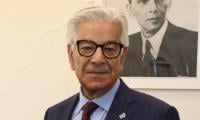LAHORE: Although a section of the pro-government Indian press claims that Prannoy Lal Roy and his wife Radhika Roy, the co-founders of reputed Indian television channel, the “NDTV,” were stopped from flying abroad by authorities at Mumbai airport as per a request filed by the Central Bureau of Investigation that is probing the duo in a money laundering case, it is quite an open secret that this relatively free media house across the border has not surely lived up to the expectations of the incumbent Modi regime, particularly with reference to its more recent reporting on the unrest in Held Kashmir.
There is no doubt that while the “NDTV” does support every Indian government’s stance on Occupied Kashmir with a ‘national zeal,’ it also sometimes highlights the atrocities inflicted by Indian Army on the innocent Kashmiris too, something that may surely have enraged Narendra Modi’s government, which currently hates to listen or read anything against its outrageous act of revoking the special status of Held Kashmir, and its decision to send additional troops to the region and putting it on lockdown.
Well, as it has been the case in Pakistan for decades, where both independent journalists and media owners have been dubbed traitors, RAW stooges and CIA agents etc by those at the helm of affairs in various governments and in different eras, the “NDTV” owners have now been labeled as Pakistani surrogates by social media activists.
And not far is the time when we might hear certain Indian politicians, especially those enjoying life in the echelons of power, slate “NDTV” and call its owners betrayers, back-stabbers, double-crossers, renegades or even serpents and snakes!
Here follows the coverage of another Indian media house, the “India Today,” after the “NDTV” founders Prannoy Roy and Radhika Roy were barred from flying broad in the world’s largest democracy called India.
The “India Today” had reported:” According to sources, the airport authorities did not let the two fly as per a request filed by the Central Bureau of Investigation. Prannoy and Radhika Roy are being investigated by the CBI in a money laundering case. Issuing a statement on the incident, the media company termed it “complete subversion of media freedom.”
The renowned media outlet had added: “In a complete subversion of basic rights, NDTV founders Radhika and Prannoy Roy were today prevented from leaving the country,” NDTV said in a series of tweets. “Both journalists had tickets to return to India on the 16th, just a week later. They have been stopped from traveling abroad on the basis of a fake and wholly unsubstantiated corruption case initiated by the CBI that was filed two years ago,” it said.”
And here follow a few tweets from an Indian Twitter activist called Geetika Swami:
“Not the first time, NDTV has embarrassed itself trying to ‘mediate’ between India and Pakistan. Why NDTV is over zealous on the matter rather staying neutral and unbiased?”
“Why can’t the NDTV accept the fact that except those who made a living out of militancy, people are actually happy in Kashmir after the abrogation of Article 370?”
“Who needs enemies, when you have media like these?”
“Why NDTV Founders Prannoy Roy and Radhika Roy should be trusted?”
“NDTV Fame Prannoy Roy and Radhika Roy both are allegedly involved in money laundering and bank fraud causing at least Rs 48 crore loss to ICICI Bank.”
And, as history tells us, this is not the first time any Indian media mogul or working journalist has been called a traitor, just when it had somehow ceased to dance to the tune of the sitting regimes, calling shots from New Delhi.
In October 2016, an eminent Indian journalist, Barkha Dutt, had hit out against abusive trolls who had questioned her patriotism again.
The “BBC News” had reported: “The first message sent is a screenshot of Barkha’s tweet, quoting the statement made by the Indian DGMO. However this was interpreted as Barkha informing the Pakistani DGMO about the surgical strikes. The rest of the messages translated read: “Informing the Pakistani DGMO is treason to the country, Barkha.” “You better learn, you traitors; if ‘desh bhakts’ lose it, then they will hunt you down and kill you, there will be nowhere to run.” “If your mother has breast-fed you and if you have a father, then (be daring enough to) say this not on Twitter but at a street corner.”
The British media house had added: “In her response on Face book, Barkha had called the attack “a cunning and criminal vilification campaign to intimidate and scare and target people”. She went on to state that both the Left and the Right have targeted her for doing her job. Barkha had earlier lambasted “Times Now” Editor-in-Chief Arnab Goswami for calling for action against “pseudo-secular and pro-Pakistan journalists.”
On Sunday, August 11, Barkha Dutt, who had been part of NDTV’s team for 21 years, until she left the channel in January 2017, had again tweeted her views on Pak-India rivalry to win more enemies.
She had tweeted: “We have all spent years reporting from Kashmir without mobile phones and internet connections. We are not the story. Innovative reporters have always found a way. It’s the classic challenge of field reporting. The victims of the communications blockade are the people. Not us.”
“Idrees ul Haq wants his mother who lives in Lal bazaar Srinagar to know he is safe and coming home on 14th August. He has not been able to reach her all week. She is diabetic and he is worried. I’ve said it before: take any side on 370, this communication blockade must be lifted.”
Here follows some of her tweets of August 3, 2019:
“Allusions to a Pakistan-China nexus factor among high level officials in Jammu and Kashmir to explain what is happening. With advisories in place well beyond typical areas of internal turmoil (Kargil for e.g), our focus was internal (35A), the theatre could well be external.”
“So while we assumed the additional troops are for possible turmoil that could follow Article 35A changes, the moment GOI advisory in a place like Kargil, it tells you to look at border/LoC etc and possibly understand the deployment in that framework of army & CRPF reassignment.”
“Suddenly Trump offer of so called mediation, the near US peace deal in Afghanistan, All of it, cannot be divorced from whatever is unfolding in Jammu and Kashmir, where more and more, I believe the internal issues are absolute red herrings. The story& fault line appears external.”
The 47-year old Barkha had emerged as a prominent figure after her frontline war reporting on the Kargil Conflict between India & Pakistan in 1999.
It goes without saying that despite being ‘chained’ by visible censorship on the issue of Held Kashmir, a few Indian journalists of repute, like Barkha Dutt, are still trying to ink or air facts.
As far as the “NDTV” is concerned, it had recently quoted the Indian National Congress President Rahul Gandhi, a political arch rival of Narendra Modi, who had hinted at receiving disturbing reports from the Valley (Held Kashmir), besides asserting that Premier Modi and his government were not ‘clean’ on the matter.
The report aired by “NDTV” in this context had maintained: “A meeting of the Congress’ top decision-making body to appoint its next chief was briefly halted after reports of “violence and deaths” emerged from Jammu and Kashmir, former party president Rahul Gandhi claimed on Saturday night. He said this to media just minutes before the party leadership formally announced that his mother, UPA chairperson Sonia Gandhi, has been appointed as the interim Congress chief.”
The “NDTV” had added: “Rahul Gandhi, who emerged from the meeting around 10 pm, said that the meeting to choose his successor was stopped over disturbing reports from the Valley. “Things are going very wrong there. There are reports of violence, of people dying. We stopped deliberation on our meeting to conduct a presentation on the situation in Jammu and Kashmir,” he told reporters. “It is imperative that Prime Minister Narendra Modi and the central government come clean on the matter.”
But the Modi government is not just going hard against its local media houses for reporting anything against its wishes or policies on Kashmir, it is also accusing some globally-acclaimed organizations like the “BBC News” of coming out with ‘inaccurate’ and ‘misleading’ reports on the state of life in Held Kashmir after the recent abrogation of Article 370.
The Indian government’s assertion had come after the “BBC News” had reported: “Despite the unprecedented security lockdown, thousands of people demonstrated in Srinagar and were met with live fire, tear gas and rubber-coated steel bullets.”
This is what the “BBC News” has recently tweeted in response to Indian government’s allegations: “The BBC stands by its journalism and we strongly refute any claims that we have misrepresented events in Kashmir. We are covering the situation impartially and accurately. Like other broadcasters, we are currently operating under severe restrictions in Kashmir but we will continue to report what is happening.”
Research shows that over the years, numerous Indian film actors have also been labeled as Pakistani agents.
These include Naseerudin Shah, who had expressed anxiety in an interview over the growing mob violence in India during December 2018.
Retaliating to Shah’s statement, an Indian Uttar Pradesh politician, Amit Jani, had said he had booked a one-way ticket to Pakistan for Naseerudin Shah. The “Times of India” had reported that Jani had bought a ticket for August 14, which was Pakistan’s Independence Day for Shah who was then facing a major controversy.
‘Leave the country,’ internet trolls had also told Indian actor Naseeruddin Shah.
Earlier, the late Om Puri, a famous name in world theatrics and a legendary figure for India’s Bollywood, had come under serious thrashing after his comments on the escalated ties between India and Pakistan had infuriated many of his compatriots and colleagues.
On October 4, 2016, a treason case was filed against Om Puri for insulting Indian army and supporting Pakistani artists seeking work in India.
After another Bollywood star Salman Khan had opposed a ban on Pakistani artists, veteran actor Om Puri had also lent his support in favour of Pakistani actors, saying the ban on them would not change the situation.
In a TV talk show, Om Puri said, Pakistani actors were not working illegally in India.
He had remarked: “If they are sent back, Indian producers, who have signed them for their films, will suffer heavy losses. Who had asked the soldiers to join the army? Who told them to pick the weapons?”
The veteran actor had called for peace between India and Pakistan, saying, “Do you want India-Pakistan enmity to turn like Israel and Palestine, and fight for ages? Several Indians have their relatives staying across the border and vice-versa, how can they fight a war with their cross-border families?”
Besides many several social media users, filmmaker Ashoke Pandit and veteran actor Anupam Kher had come out against Om Puri and slammed him over his remarks.
On January 6, 2017, Om Puri was said to have died from cardiac arrest.
But, a preliminary postmortem has revealed that the actor did not die of ‘natural causes,’ the “India Today” had reported!
Research shows that defamatory campaigns against some leading national media houses and noted journalists have also been initiated in Pakistan throughout country’s history.
They were portrayed as being anti-Pakistan elements, promoting Indian and American agendas for certain gains. They were made controversial through pocket media outlets and deliberate efforts were made to turn a common man in the street turn against them, thus endangering their lives and businesses.
Just to cite one such precedent in this context, a couple of years ago, a PPP loyalist sitting in the Gilgit-Baltistan Assembly had dubbed a few Jang Group staffers as agents of Israel, India and Russia, demanding that these ‘traitors’ should be arrested and hanged.
This PPP stalwart Raziuddin Razi had to bite dust and hide for cover, when he was strongly condemned by various sections of the society for his outrageous remarks.
Faiz Ahmad Faiz (1911-1984), the influential left-wing intellectual, journalist and poet, was named and linked by Premier Liaquat Ali Khan’s government for hatching a conspiracy against it.
After an 18-month trial conducted in secrecy, Faiz had received a maximum sentence from the Army’s JAB Branch, though the punishment was commuted after the assassination of Liaquat Ali Khan.
The defence lawyer in this case was the notable Bengali Muslim politician Hussain Shaheed Suhrawardy, who later became Pakistan’s prime minister in 1957.
Basically, the Pakistani rulers have also been toeing the legacy of the post-1857 British Empire.
After the 1857 War of Independence, two Muslim editors of media houses called the “Doorbin” and “Sultanul Akhbar,” were prosecuted and Maulvi Baqir, the editor of “Delhi Urdu Akhbar,” was shot dead for criticizing the British rule.
Maulana Muhammad Ali Johar (1878-1931) and Maulana Shaukat Ali (1873-1939), the two illustrious brothers and heroes of Indian Muslims before 1947, were first jailed in 1914 by the British government for producing an article in defence of the Turks. Basically, it was a strong response to a London Times anti-Turk article in these “Khilafat Movement” days.
Maulana Zafar Ali Khan (1873-1956), a high caliber writer, poet, translator and journalist, was arrested and forced to live in jails for years for challenging the British elite.
The charges leveled were, of course, sedition and treason.
He had launched his newspaper “Daily Zamindar” from Lahore, though it was founded by his father Maulvi Sirajuddin Ahmad in Hyderabad Deccan.
During First World War (1914- 1919), “Daily Zamindar” was asked not to publish any war news. So, it was closed down temporarily and Zafar Ali Khan had to start another magazine “Sitara-e- Subah.”
Agha Shorish Kashmiri (1917-1975), a known scholar, debater and the chief editor of the weekly “Chattan” was sent behind the bars many a time in his eventful life.
He was first arrested during the anti-Qadyani Movement of 1953.
While General Sher Ali was handcuffed on the charge of sedition for giving an innocuous speech, Shorish was taken into custody under the Defence of Pakistan Rules.
As soon as Bhutto attained power, he dismissed the chairman of National Press Trust (that he had vowed to abolish) and the editor of Pakistan Times.
His rival from the Ayub days, Altaf Gauhar, who was then the editor of Daily Dawn, was placed under arrest.
The printers, editors and publishers of magazines like “Urdu Digest,” “Zindagi” and “Punjab Punch” were arrested for protesting against Bhutto’s regime. Newspapers like “Hurriyat” and “Jasarat” were banned and their editors imprisoned.
They were convicted and sentenced even before the writ petitions challenging their arrests could be heard in the Lahore High Court.
Noted poet Habib Jalib and famous religious scholar Abul Kalam Azad had also faced jails for confronting different governments.
Dr Maleeha Lodhi, Pakistan’s former ambassador to the US and the UK, was accused of sedition in 1992 by the then government because she had published a hostile poem in “The News International.”
She was the editor of this newspaper then.
Famous former “Geo News” anchorperson, Najam Sethi, can also tell a lot about sedition charges against him and other fellow Pakistani journalists. In 1999, when Sethi had tried to expose the then government scandals to the BBC, he was accused of treason.
The supreme court of Pakistan had rejected the trumped up charges of “treason” and freed him after one month.
Khawar Manika's counsel continued his arguments on Wednesday in a petition filed by Imran Khan and Bushra Bibi
IHC reserved judgment on the petition against registration of cases against former interior minister Sheikh Rashid on...
Saudi woman who was reportedly kidnapped from Islamabad’s residential Sector F-8 in mysterious circumstances, has...
Pakistan Navy warship rescued 8 Iranian fishermen after their boat caught fire in the open sea
SC dismissed appeal against SHC order that turned down application of partner seeking extension of time to furnish...
Executive board of International Monetary Fund will meet on April 29 to discuss the approval of $1.1 billion funding...







